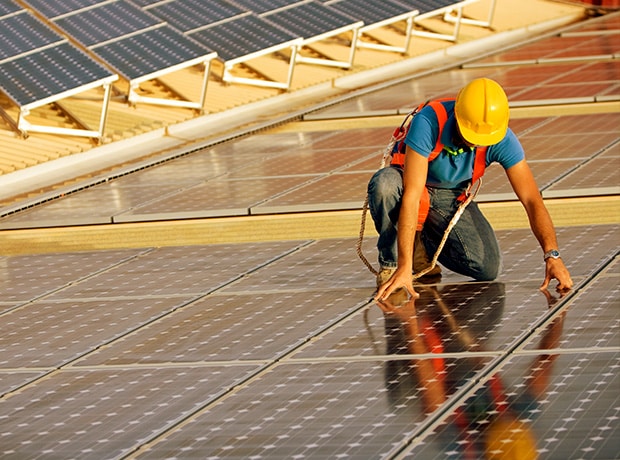Solar Panel Building Regulations for UK and European Businesses
Solar panels have dropped in price and risen in popularity over the past few years. It’s no surprise; as energy prices soar, the business case for self-consumption and selling power back to the grid has never been more attractive.
But, once you’ve decided you want to introduce solar to your site, how do you go around getting the paperwork through? Who do you even need to notify? This article simplifies the “red-tape” and highlights which agencies need to be involved whether you’re installing in the UK or Europe.
UK permits and approvals:
1. Planning Permission
If your solar installation is on a listed building, located in a conservation area, or exceeds certain size limits, you will need to get planning permission. However, many small-scale solar panel installations are covered by permitted development rights. You do not need to seek planning permission for these types of projects.
2. Building Regulations Approval
Solar panel installations must comply with building regulations, which cover issues such as structural safety, fire safety, and electrical safety. You can obtain Building regulations approval from the local authority or an approved inspector.
3. Grid Connection Permission
If you plan to connect your solar panel system to the grid, you will need permission from the local Distribution Network Operator (DNO). This is known as a G99 application.
Czech Republic permits and approvals:
1. Building Permit:
You need a building permit to install solar panels on the roof or facade of a building. The local building authority issues all permits.
2. Connection Agreement
Before installing a solar panel system, you need to broker an agreement with the electricity distribution company to connect to the grid. You need to sign the conwwnection agreement before the solar panels are installed.
3. Approval from the State Energy Inspectorate
Approval from the State Energy Inspectorate is required for solar panel systems with a capacity greater than 10 kW.
4. Registration with the Energy Regulatory Office
All solar panel systems must be registered with the Energy Regulatory Office. The registration process involves providing information about the system’s capacity, location, and expected electricity production.
Slovakia:
1. Building Permit:
Similar to the Czech Republic, a permit is required for installations.
2. Connection Agreement
Agreement with the distribution system operator (DSO) is necessary.
Holland:
1. Building Permit:
In the Netherlands, a building permit is generally required for solar panel installations. This permit ensures compliance with local building regulations and standards.
2. SDE+Subsidy:
In addition to the permit, businesses can apply for the SDE+ subsidy (Stimulering Duurzame Energieproductie), which provides financial support for renewable energy projects, including solar installations. This subsidy encourages the adoption of sustainable energy solutions.
Poland:
1. Building Permit:
Similar to other countries, a building permit is required in Poland for installing solar panels. This permit ensures that the installation meets local building codes and safety standards.
2. Connection Agreement
Before connecting a solar panel system to the grid, businesses need to negotiate and sign a connection agreement with the grid operator. This agreement specifies technical details, connection fees, and operational requirements for grid integration.
Bulgaria:
1. Building Permit:
Solar panel installations in Bulgaria require a building permit. This permit ensures compliance with construction standards and safety regulations.
2. Grid Access Permission:
To connect the solar system to the grid, businesses must obtain grid access permission from the grid operator. This permission outlines the terms, conditions, and technical specifications for connecting to the electricity grid.
Spain:
1. Building Permit:
In Spain, obtaining a building permit is necessary for solar panel installations. This permit verifies compliance with local building regulations and safety codes.
2. Grid Connection Agreement
Before connecting to the grid, businesses need to secure a grid connection agreement from the distribution network operator (DNO). This agreement defines the technical requirements, connection fees, and operational conditions for grid integration.
Portugal:
1. Building Permit:
Similar to other European countries, you need a building permit in Portugal for solar panel installations. This permit ensures that the installation meets local construction standards and safety regulations.
2. Connection Agreement
Before connecting the solar system to the grid, businesses must obtain approval and sign an agreement with the DSO. This agreement specifies the technical requirements, grid connection procedures, and operational guidelines for integrating solar energy into the grid.
Summary
Each country has specific regulations and procedures, influenced by factors such as system size, location, and local policies. Consulting with local authorities or a knowledgeable advisor is advisable to ensure compliance with all requirements and to optimize the installation process.
For businesses looking to implement solar solutions across Europe, understanding these regulations is crucial for successful project execution and compliance with local laws. Whether navigating planning permissions, securing grid connections, or ensuring regulatory approvals, thorough preparation and understanding are key to leveraging the benefits of solar energy effectively.
For more information on sizing and managing a full-scale solar, battery, and EMS solution across Europe, contact our team to discuss your specific needs and regulatory requirements.
Note: The specific requirements for Solar Panels & Building Regulations may vary depending on the location and size of the solar panel system, as well as other factors. We firstly recommend that you consult with local authorities to obtain the most relevant information for your site.
For more information on sizing and managing a full-scale solar, battery and EMS solution, contact our friendly team.
